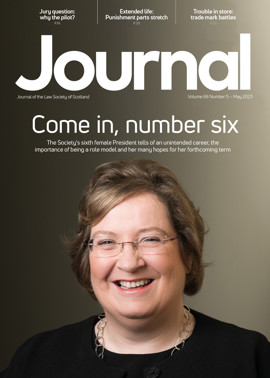Book reviews
Coercive Control and the Criminal Law
Cassandra Wiener
PUBLISHER: ROUTLEDGE
ISBN: 978-1032422879
PRICE: £34.99
 Dr Cassandra Wiener is a senior law lecturer at The City Law School. In this thesis, at its simplest, she compares and contrasts the policy development of the criminalisation of coercive control between England & Wales and that in Scotland.
Dr Cassandra Wiener is a senior law lecturer at The City Law School. In this thesis, at its simplest, she compares and contrasts the policy development of the criminalisation of coercive control between England & Wales and that in Scotland.
Her short conclusion is that the Scottish approach, as enshrined in the Domestic Abuse (Scotland) Act 2018, allows for an “all of a piece” approach for police and prosecutors, which essentially enables prosecution for all aspects of coercive control, whereas this is denied in England due to the fragmented approach which sees coercive control as a bolt-on to the already available substantive crimes. Essentially, coercive control appears to be regarded as an aggravation under English criminal law, whereas in Scotland the legislators have created a new offence which encompasses and criminalises coercive behaviour.
The author further describes that the English law definition of domestic abuse provides a “bullet point” approach. If a, b or c occur, it can be seen within the context of domestic abuse, as opposed to the holistic coercive relationship which can be prosecuted in Scotland provided a course of abusive behaviour towards a partner or ex-partner is proved.
Wiener considers the way in which the legislator and practitioners might approach the proof of a course of behaviour, and says: “this is the only aspect of the DASA I think that is actually less progressive than its English/Welsh equivalent”. The author notes it would be left to the courts to determine what constitutes two incidents. The High Court of Justiciary in the recent decision of HM Advocate v CA [2022] HCJAC 33 answered that question, holding that the Act created a new offence, namely “a separate crime known as a course of conduct”.
On the question of corroboration and therefore proof of such a course of abusive behaviour, the court went on to say: “It is the course of behaviour which is the core of the offence, and it is thus the course of behaviour – in other words proof of behaviour ‘on at least’ two occasions – which must be established by corroborated evidence. Once there is corroborative evidence of this kind it is open to the jury to determine that other incidents equally form part of the course of conduct, even though spoken to by only one witness. Where the commission of a course of conduct is the core element of an offence, it is the proof of a course of conduct which constitutes the relevant essential element of the offence.”
The court equiparated the course of conduct with the evidence required to prove a single charge of assault, concluding: “there is no need for every element of the libel to be corroborated”.
Apart from a thorough, thoughtful and careful analysis of the law, the author also offers insight into the impact of coercive control. She draws on a wide and diverse range of sources and the contributions made to policy development. This book merits a wide readership.
David J Dickson, solicitor advocate
Perspectives
Features
Briefings
- Civil court: Spotlight on the Sheriff Appeal Court
- Employment: Must do better – the s 23 approach
- Human rights: Crime, detention and mental health issues
- Pensions: A question of tax
- Scottish Solicitors' Discipline Tribunal: May 2023
- Family: The slide rule of grave risk
- In-house: A route to diversity






